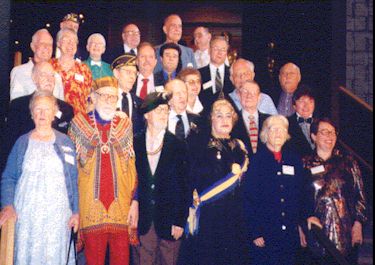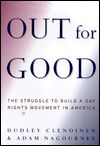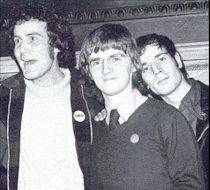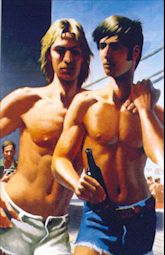 |

 |
|
By Dudley Clendinen and Adam Nagourney Book Review By Jack Nichols OUT for GOOD: The Struggle to Build a Gay Rights Movement in America by Dudley Clendinen and Adam Nagourney—Simon & Schuster, 682 pp., $30
"I hope you can offer a quote that we can use to draw attention to this splendid book."
 America's Gay Pioneers gather, May 22, 1998.
Gay Today's 6'3" editor Jack Nichols stands center, top row.
America's Gay Pioneers gather, May 22, 1998.
Gay Today's 6'3" editor Jack Nichols stands center, top row.
Simon & Schuster naively sent me an uncorrected reader's proof of this forthcoming book. The publisher had also naively spent a reported $275,000 as an advance for its two very vicious authors, hack reporters who'd promised, at the dawn of the current decade, to provide an accurate history of the gay rights movement. It took them seven years to birth a bowel movement, instead. The gargantuan sum given them (originally said to have been only $250,000) seems more an appropriate fine for a publisher hoodwinked into springing this Jerry Springer-style book on an unsuspecting public.
 Because OUT for GOOD is scheduled for release next month—no doubt as a 'gay pride' offering— there's still time, I hope, to issue advance warnings.
Because OUT for GOOD is scheduled for release next month—no doubt as a 'gay pride' offering— there's still time, I hope, to issue advance warnings.
On the cover of the book's proofs it says: "Do not quote for publication until verified with finished book." Very well, then, I won't quote. I'll simply tell about the drivel I've read. The title—OUT for GOOD-- is a hackneyed misnomer. There's nothing "good" about this ugly book's dreary, cynical spirit. Clendinen's and Nagourney's trashing of heroic people now dead, people who can no longer defend themselves, has happened for other reasons as well. It's happened because—with the hubris their credentials in the mainstream press has lent them—they've waded into a complex thirty-year period armed with a preponderance of gall and with prissy predilections for badmouthing. It's as if these authors made a deliberate decision to turn "If you can't say something nice about someone, don't say anything at all," into a bad joke. Having myself been at ground zero co-editing America's first gay weekly newspaper in Manhattan, a perch that brought me into close, regular association with the brave activists these "historians" so delight in maligning, I'm qualified to critique Clendinen's and Nagourney's abysmal ignorance of the early 1970s. There are some truly talented gay and lesbian historians, including John Loughery, James T. Sears, Lillian Faderman, John D'Emilio, Donn Teal, Charles Kaiser, Rodger Streitmatter, Kay Tobin and Edward Alwood who deserve much credit. But Walt Whitman's suspicions about historians seem especially apt in any discussion about Dudley Clendenin and Adam Nagourney. Whitman said: Historians are either liars themselves or they depend on liars for their information.
It's as if they're saying that a bunch of clumsy, mal-adapted misfits effected nigh-miraculous changes in society while being flatulent clods themselves. The result is a collection of catty, untidy rumors strewn in a crossfire of crass-mentality glee. Frank Kameny, the father of American gay activist militancy and my longtime comrade in arms, is likened to a snapping turtle with a voice like a foghorn. Other deliberately unkind references, including Kameny's thinning hair, show up Clendinen and Nagourney's unending focus on things negative. Kameny himself can easily laugh today, I hope, at the authors' curt dismissal of him at the end of a 1971 chapter claiming he would never lead the gay rights movement again. It was Kameny, as GayToday just recently reported, who-- this year-- became first to speak about gay/lesbian issues—on the Voice of America—to the teeming billions of China. But let's take a quick peek at how Clendinen and Nagourney treat other activists. Bill Bahlman lives in a tiny cramped apartment and is described as a string bean. Michael Petrelis is described as sloppy and rolly poly. Randy Wicker is nasal. Such unflattering physical commentary is—from coast to coast-- rampant in OUT for GOOD.
A third unreliable 'source' used for these bios is the long-deceased Arthur Bell, author of Dancing the Gay Lib Blues. Blues indeed. Arthur once wrote a couple of movie reviews for the newspaper I edited. Later, he became a columnist for the Village Voice. His more temperamental columns in the Voice had earned him a reputation as one whose interests, like Clendinen's and Nagourney's, tended toward the macabre. "Arthur Bell isn't interested in gay news," said one of his critics, "unless it involves a murdered drag queen whose body has been found floating near the Christopher Street pier." Marty Robertson and Jim Owles were friends of mine. They knew I'd been active in the movement a decade before they'd arrived on the scene. AIDS, unfortunately, claimed them both in the early 90s, but not before each had wracked up considerable notice for their latter day avant garde activism. Owles' obituary in the New York Times, for example, told not only about his early exploits, but also about his 90s Democratic party activism. Clendenin and Nagourney's ill-researched book, however, leaves a "tight little-old-manish" Owles (a quote from Arthur Bell) alone and friendless in the early 70s while stupidly accusing him of being a shoplifter (in the 60s-70s counterculture?) whose last miserable job was in a gay bathhouse. Reading these tawdry lies, my coolest response sounds so furious as I say it aloud to myself, that a strategic silence seems the better route. Marty Robinson— whose life gets wrapped up at the end of chapter four (1971)—is left to die much later—in 1992— bitter at his treatment in history and with his brain ravished by AIDS infections and a reputed speed habit dug up, no doubt, by his old upstaged still-around nemeses in GLF.
Its easier, I suppose, for "historians" to report as a twosome so that they can later blame their grossest mistakes on each other. How and why Simon & Schuster decided to give these two dorks a history book to write remains a mystery. But while all dual history-writing assignments should be suspect, this duo—Clendinen and Nagourney-- both blatant traitors to the cause of gay liberation, eagerly accepted their high-paying assignment for which, sadly, they lacked all prerequisite qualifications. |
 © 1997-99 BEI
© 1997-99 BEI
 GayToday's Jack Nichols (left) with Jim Owles (center) and Marty Robinson, 1971
GayToday's Jack Nichols (left) with Jim Owles (center) and Marty Robinson, 1971  Marty Robinson (right) and his lover, Tom, Doerr. It was Doerr who
introduced the Lambda symbol.
Marty Robinson (right) and his lover, Tom, Doerr. It was Doerr who
introduced the Lambda symbol.